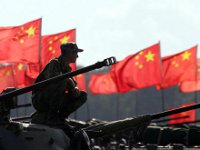Registration
Thank you!
You will receive an email confirming your registration.
IMGXYZ3248IMGZYXTalks between China and the United States on their nuclear weapons programs seem to be at an impasse, with frustration and disappointment expressed on both sides. U.S. officials want more transparency and direct high-level military-to-military strategic nuclear dialogue, while the Chinese believe they have been more transparent than their counterparts.
Gregory Kulacki from the Union of Concerned Scientists and Carnegie’s Li Bin discussed the challenges of promoting effective U.S.-Chinese nuclear negotiations and how to improve talks in the future.
“Chickens Talking with Ducks”
- Dialogues at an impasse: Kulacki explained how discussions have reached a stalemate due to mistrust, miscommunication, and misunderstanding. U.S. security analysts discount China’s pledge to not use nuclear weapons first, while Chinese participants resent U.S suspicions and ascribe it to hegemonic arrogance, he explained. The two sides are talking past each other, he added, like as the Chinese adage goes, “chickens talking with ducks.”
- Two different vocabularies: In an effort to minimize misinterpretations during nuclear dialogues, U.S. and Chinese arms control experts created a 1,000 term glossary related to nuclear security. However, Kulacki said, the two sides were unable to reach consensus on several key concepts, such as the difference between “limited deterrence” and “minimal deterrence,” two decidedly different policies. Moreover, the Chinese defense industry and the Chinese Second Artillery did not collaborate on nuclear terminology. Consequently, the language used at bilateral dialogues does not always match the language in Chinese military texts, causing U.S. diplomats and analysts to be suspicious of Chinese nuclear policy.
- One nuclear weapons policy: Kulacki concluded that China’s declared nuclear weapons policy, as outlined in a classified Chinese textbook, The Science of Operations of the Second Artillery, is explicit and consistent. Despite accusations to the contrary, the text clearly denotes that China maintains a small force kept off alert and used only for retaliation.
The Second Artillery
- Reluctant participation: U.S. officials want more frequent and direct military-to-military strategic nuclear dialogue between the U.S. Department of Defense (DoD) and the Chinese Second Artillery (SA), the branch of the Chinese People’s Liberation Army responsible for operating land-based nuclear and conventional missiles. The SA, however, has been reluctant to participate. Li attributed this reluctance to the SA’s lack of confidence due to their predominantly military, not scientific, expertise and minimal institutional experience in nuclear policy dialogue.
- Track 1.5: Li emphasized the utility of track 1.5 and track II dialogues for building confidence in dialogue on nuclear policy issues and promoting interagency discussion in China between the SA, other Chinese organizations, and individual experts on nuclear strategy.
Parsing the Differences
- Understanding miscommunications: Kulacki called on U.S and Chinese negotiators to make a better effort to understand the reasons behind their respective policies. In particular, both sides should appreciate the others’ history of and justification for their no-first-use postures, he said.
- Building expertise: Li concluded that foreign pressure will not bring the Chinese to the table. Rather, expertise is a key variable in shaping the Chinese nuclear establishment and SA attitudes toward dialogue. To encourage the SA to be more active in nuclear talks, he recommended the United States and China use track 1.5 dialogues as a place for the SA to develop expertise and institution culture.
- Investing in dialogue: Both scholars called for the United States and China to facilitate exchanges among students and young officials on strategic nuclear issues. This type of intercultural engagement will help lay a foundation for the two governments to develop effective and high-level strategic dialogue in the near future.
